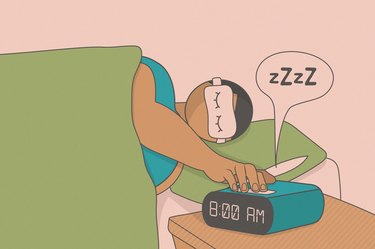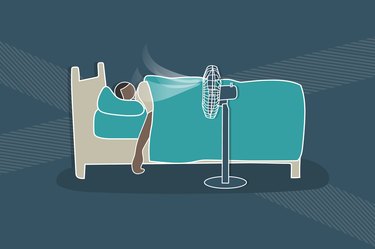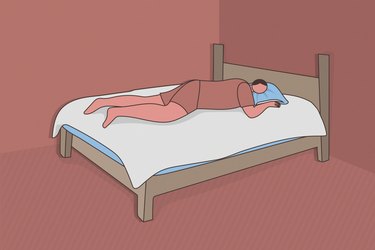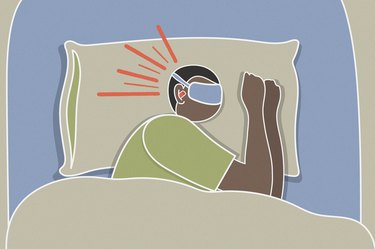
There's something almost magical about those snatched moments of sleep that occur after hitting the snooze button.
Many people succumb to the lure of snoozing once — or several times — after their wake-up alarm goes off. After all, on both apps and physical alarm clocks, the snooze button is typically far larger than the one that turns the alarm off.
Video of the Day
Video of the Day
But while the appeal of extra zzzs is clear, could hitting the snooze button be a harmful habit? We spoke to experts to find out what it says about your sleep, and the potential effect it could have on the person sharing your bed.
The Effects of Hitting Snooze
1. It Might Make for a Stressful Morning
Snooze too long, and you may find yourself skipping important parts of your morning routine — like showering, packing lunch or eating breakfast. You might arrive late to appointments, school or work, too. All this can add up to a stressful morning.
That said, "night owls usually have their routine down to a science," Allison Siebern, PhD, CBSM, head sleep science advisor at Proper, tells LIVESTRONG.com. If you're a frequent snoozer, you likely know precisely how many times you can hit the button before serious repercussions start rolling in.
2. It's Likely Disrupting Your REM Sleep
While those extra moments of sleep can feel precious, most likely, they're neither high quality nor restorative, per the Cleveland Clinic. Throughout the night, you cycle through the four stages of sleep, explains sleep disorder specialist Alicia Roth, PhD. Each cycle lasts about 90 minutes, with REM (aka rapid eye movement) sleep at the end — this isn't a deep sleep, but where your brain is recharging, she says. The brain activity can lead to vivid dreams, Roth notes.
"When the alarm goes off, most people are transitioning out of REM or light sleep. If you snooze your alarm and go back to sleep, you may be diving right back into REM. But then nine minutes later your alarm goes off again! And you're pulled out of REM again. Which is a very uncomfortable feeling," Roth says.
Snoozing can extend sleep inertia compared to a one-and-done alarm, according to the results from two December 2022 studies published in the Journal of Physiological Anthropology. Sleep inertia is the experience of being groggy, sluggish or generally crabby after waking up from a nap or sleeping awhile, per the Centers for Disease Control and Prevention (CDC). While sleep inertia usually stops within 30 minutes, it can last up to two hours, according to the CDC.
3. It May Spur Some Resentment
The repeated alarm sounds can really mess with your partner's sleep.
It's potentially disruptive when someone else's alarm goes off again and again, Siebern says. "The brain doesn't shut off completely as we're sleeping. It's always scanning the environment for any stimuli that's happening to make sure we're safe," she says. That's why a fire alarm will wake you up — and a nearby buzz of a phone alarm.
Keep hitting the snooze button over and over and it "can definitely lead to your partner feeling annoyed and irritated," says Josh McKivigan, LPC, a behavioral health therapist based in Pittsburgh, Pennsylvania. And that resentment can potentially build — especially if you're snoozing away the morning while your partner gets up and takes on the day's responsibilities, like getting kids off to school, McKivigan says.
Why Do People Snooze?
There's no real harm to snoozing occasionally, or even daily.
"The snooze button can be a nice way to procrastinate waking up, or wake up a little more gently," says psychiatrist and sleep physician Alex Dimitriu, MD, founder of Menlo Park Psychiatry & Sleep Medicine and BrainfoodMD.
But when it's a daily, not occasional, habit, it should prompt you to ask why hitting the snooze button is woven into your wake-up routine, Siebern says
Here's a few of the factors that could be occurring if you find yourself routinely snoozing:
1. You’re Going to Bed Too Late (or Waking Up Too Early)
The simplest explanation is the most likely culprit here: "You snooze because your body wants to keep sleeping," Dr. Dimitriu says. Any number of factors could lead to a person being short on sleep, from a new baby to shift work requirements, Roth points out.
You may simply be going to bed too late. Most likely, for a host of practical reasons, like getting off to school or arriving at work on time, your wakeup time is set and can't move, Siebern says. So if your nighttime routine goes long, you'll be sacrificing some sleep. In the morning, you'll feel the effects of watching just one more episode, racing through one more chapter or getting lost in the social media scroll.
Or it could be that you're "used to sleeping later than you are waking up," Dr. Dimitriu says. Maybe you've got an early morning flight prompting a pre-sunset alarm, or maybe your Monday wake-up time is hours earlier than when you get out of bed during the weekend.
You might just need more sleep than you think you do. If you're between the ages of 18 and 60, you should get at least seven hours of sleep each night, according to the CDC.
Experts often talk about people needing eight hours of shut-eye each night. But Siebern points out that's an average — some people may get by with six or seven hours, while others may need nine to feel refreshed, she says. That means it's important to understand your individualized sleep needs, and aim for that amount of sleep every night.
Related Reading
2. You’ve Got a Sleep Disorder
Say you're going to bed every night at 11 p.m. and setting an alarm for 7 or 8 in the morning. You're doing everything right when it comes to the quantity of sleep. So if you wake up unrefreshed, and hit the snooze button from your groggy daze, it could be an issue with the quality of your sleep.
Sleep apnea is a prime culprit: With this condition, your breathing pauses as you sleep, according to the Mayo Clinic. Take sleep apnea seriously: Diminished sleep quality can have an effect on your health. Experiencing sleep apnea ups your risk for type 2 diabetes, high blood pressure and other serious health consequences, per the Mayo Clinic.
If you suspect you have sleep apnea — or another sleep disorder — check in with your primary health care provider, Siebern recommends. Most likely, they'll ask a series of questions. This screening process will help determine if you should have a sleep study, or be referred to a sleep clinic for further assessment, she says.
3. You’re Naturally a Night Owl
For the most part, the world isn't designed for night owls. School and work start times tend to be early — and even before you arrive at those obligations, there's a whole morning routine to get through.
If you're a night owl, you may be more inclined to use the snooze button. After all, you're sleeping against your biology, Siebern says.
Your body temperature, sleep- and wake-time and other processes in your body run on a 24-hour cycle known as the circadian rhythm, according to the UCLA Sleep Disorders Center. All sorts of things can affect your circadian rhythm. For instance, blue light from electronic devices can make falling — and staying — asleep harder, per the CDC. There's a genetic component, too.
While we tend to casually identify ourselves as larks or owls, the circadian rhythm types are on a spectrum — not a binary classification, Siebern points out. Your night owl tendency may be mild, moderate or more extreme. Some people may find themselves sleeping through alarms entirely, while others may just feel like their sleeping patterns are a bit off from their preferences, she says.
How to Stop Hitting Snooze
Your first step: Sleep more. "Getting more sleep, at regular bed and wake times, should help reduce the need to snooze," Dr. Dimitriu says.
Here's strategies to keep in mind that might help you stop snoozing — or at least limit it to a single cycle.
1. Figure Out Your Ideal Amount of Sleep
More sleep sounds like a simple remedy, but maybe you're wondering: how much more?
To find out, Siebern recommends paying attention to how much you sleep when you don't have to get up at a set time for work, school or other obligations. On vacation, for instance, or a weekend with no plans, how many hours do you clock?
Try to get a sense of your ideal amount of nightly shut-eye. Think about when you're getting the best quality sleep, too: Hardwired morning people may feel like they get better sleep in the first half of the night, but night owls may get better sleep in the second half, Siebern says.
Once you figure out how much sleep you need, your mornings may improve. "When people get enough sleep, they often wake up on their own or before the alarm clock. It's worth remembering this as you wrestle with the snooze button each morning," Dr. Dimitriu says.
2. Stick to a Sleep Schedule
Aim to wake up and go to bed at the same time, seven days a week. If you sleep in, you'll wind up shifting your bedtime later the following day, Siebern says.
That is, if you sleep in on Saturday morning, you'll wind up going to bed later on Saturday — and then in turn you'll sleep later on Sunday morning. In the evening on Sunday, as your weekday bedtime approaches, your body will feel that it's time to be awake and alert, Siebern says. It's a recipe for an appalling Monday morning. Returning to your weekday schedule will feel as though you've flown from Oregon to Virginia, battling jet lag and lost hours of rest, she says.
Sticking to a schedule is particularly important for night owls, Siebern says.
Given the tendency of their circadian rhythm, biologically their system will want to push bedtime later, she says. Resist the urge to let your bedtime and wake times drift.
Looking to get a better night’s rest? Try this 7-day kickstart plan for better sleep.
3. Set Up an AM Routine
If you tend to be sluggish in the morning and have a hard time revving up your system, "other additional cues in the morning time can be really helpful," Siebern says. "It's the very last thing the person wants," she notes, but it'll really make a difference.
Siebern recommends trying these actions to wake up your system:
- Doing a workout
- Getting morning light
- Showering
Plus, consider drinking a glass of water every morning. While you're sleeping, you're obviously not drinking. The result: You might be a bit dehydrated when you wake up, which can make you feel tired and low energy, per the Cleveland Clinic.
A consistent AM routine helps your body recognize that it's time to be awake, Siebern says. Think of it as the flip-side to your nightly wind-down routine.
4. Don't Set Multiple Alarms
It's common for night owls and people who struggle to get up to set multiple alarms, set earlier than they want or need to be up, Roth says. People do this because they know they struggle to wake up. But this strategy doesn't play out successfully. In fact, it "makes waking up much harder," Roth says.
Instead, set a single alarm. Consider placing your alarm clock out of reach — if you have to stand up and walk a few steps, you may be less likely to hit snooze.
5. Try a Different Alarm Clock
Alarm clocks are more sophisticated these days — you can try things beyond the AM radio playing or a simple buzzer. Some may adjust the room's light or try to find an ideal moment in your sleep cycle. "It may be easier to wake out of a light phase of sleep," Siebern acknowledges.
A complex alarm that makes you take action — like calculating the answer to a math problem — can be helpful, Roth says, noting that you can download apps for free with this functionality.
And even if you're sticking with your phone, your partner may appreciate a different sound than the default iPhone ringer that can get stuck in your head, McKivigan says.
Related Reading
6. Check In With Your Health Care Provider
"If you're struggling to fall asleep or stay asleep, get an adequate amount of sleep or suffering from excessive sleepiness during the day, it might be time to see your doctor for further evaluation," Roth says.
This kind of follow-up is good for your relationship, as well as your rest, McKivigan says. It shows your partner that you know the snoozing is an issue (and one that bothers them), that you're taking steps to figure out what's going on and that you're taking ownership of the process, he says.
Saying, "'Sorry, I just can't wake up,' gets old after a while," McKivigan says.
So, How Bad Is It Really to Snooze the Morning Away?
That repeated sleep-wake cycle of alarm clock, snoozing, then alarm clock again makes it harder to wake up, Roth says. And when you're finally up, it's unlikely you'll feel refreshed.
"You may feel groggy, sleepy and irritable. You're also ending a night of sleep on a bad note, which means you may feel negatively about the entire night, no matter how you sleep," Roth says.
Snoozing isn't innately bad for your health, but it might leave the person sleeping beside you feeling a bit sour. Plus, a habit of hitting the snooze button morning after morning is a likely indicator that something's a bit awry with your sleep.
"In the end, I recommend people listen to their body telling them, essentially, that they need more sleep," Dr. Dimitriu says.
- Houston Methodist: "Does Hitting the Snooze Button Help or Hurt?"
- Cleveland Clinic: "Is Hitting the Snooze Button Bad for your Health?"
- CDC: "How Much Sleep Do I Need?"
- Mayo Clinic: "Sleep Apnea"
- UCLA Sleep Disorders Center: "Circadian Rhythms"
- CDC: "The Color of the Light Affects the Circadian Rhythms"
- Centers for Disease Control and Prevention: "NIOSH Training for Nurses on Shift Work and Long Work Hours"
- Journal of Physiological Anthropology: "Effects of using a snooze alarm on sleep inertia after morning awakening"
- Cleveland Clinic: "Are There Any Health Benefits to Drinking a Gallon of Water a Day?"
Is this an emergency? If you are experiencing serious medical symptoms, please see the National Library of Medicine’s list of signs you need emergency medical attention or call 911.



